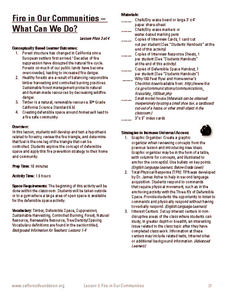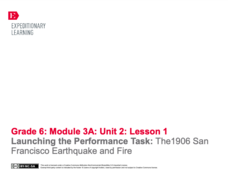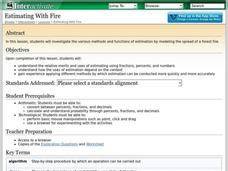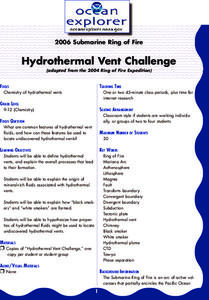Forest Foundation
Fire Investigation and Experimentation
Assess the probability of a wildfire with several lessons about fire danger ratings and risk factors. After experimenting with fuel moisture, learners explore the various elements that could contribute to a wildfire, such as wind speed,...
Nemours KidsHealth
Fire Safety: Grades 3-5
Three lessons stress the importance of fire safety. Lesson one presents several articles listing fire safety do's and don'ts; using their newly-found knowledge, learners rewrite a newspaper article about a fire incident so that...
Forest Foundation
Fire - How Does it Relate to You?
Forest fires can be a necessary step in keeping a forest healthy, but what happens when they get out of control? Learners investigate the causes and effects of forest fires in two specific areas, culminating in a report about the ways...
Forest Foundation
Fire in Our Communities - What Can We Do?
Learn about defensible space and renewable resources with a lesson about forest fires. After exploring the ways that humans have impacted the environment, kids conduct mock interviews about differing points of view in the conservation...
EngageNY
Launching the Performance Task: The1906 San Francisco Earthquake and Fire
Picture that! Pupils view photographs of the aftermath of the 1906 San Francisco earthquake and fire, discussing what they know and wonder about each image. Then, scholars watch a short video about the historic event and complete a KWL...
Shodor Education Foundation
Estimating With Fire
Watch the damage from a forest fire in this interactive simulation activity that challenges learners to estimate the burn area using different approaches. Learners are given a worksheet to track the different burn patterns and practice...
Curated OER
The Volcano Factory
Collaborative groups work together to report on the volcanic activity leading to island formation and construct models to demonstrate the process. Consider having each group present their project to the rest of the class. There are many...
Baylor College
Energy Sources
Take the concept of burning calories to a more literal level in the second of seven lessons about energy in the realm of food and fitness. Using simple materials, groups will burn breakfast cereal and a pecan to see which one gives off...
Channel Islands Film
Island Rotation: Lesson Plan 3
How far have California's Channel islands moved? What was the rate of this movement? Class members first examine data that shows the age of the Hawaiian island chain and the average speed of the Pacific Plate. They then watch West of the...
NOAA
Animals of the Fire Ice
When the sun's rays can't reach the producers in a food web, where does all the energy come from? Extreme environments call for extreme food sources. Young scientists investigate creatures that appear to get their energy from methane...
Curated OER
Hazards: First Grade Lesson Plans and Activities
Examine the environmental hazards associated with volcanoes with a three-part science lesson. In the pre-lab, first graders learn that gas, landslides, ash, and lava are all hazards that come from volcanoes. They then explore hazardous...
Forest Foundation
Exploring Heat & Energy
How does fire keep itself going? Explore the ways that heat uses fuel and energy with a lesson about the fire triangle and combustion. Several activities demonstrate how heat moves from warmer objects to cooler objects, as well as the...
NOAA
Methane Hydrates – What's the Big Deal?
Have you ever tried to light ice on fire? With methane hydrate, you can do exactly that. The ice forms with methane inside so it looks like ice, but is able to burn. The lesson uses group research and a hands-on activity to help scholars...
Curated OER
Reading Made Easy with Mindwing Concepts
While this resource is actually attempting to sell a product, the foundational ideas may be worth looking into. Using Braidy the StoryBraid doll, learners will gain a better understanding of beginning, middle, and end, as well as story...
PBS
Abraham Lincoln: Man versus Legend
Abraham Lincoln was one of the greatest presidents ever ... right? Scholars research the accomplishments and struggles of the Lincoln presidency. They uncover facts, materials and information via video clips, primary, and secondary...
NWT Literacy Council
Readers Theatre Scripts
Engage and entertain young learners with this collection of readers theatre activities. With over 25 different scripts, a wide range of topics are covered from simple counting and rhyming exercises to adaptions of popular children's...
Outdoor Learning Center
Outdoor Survival
Which of the following can you survive without for the longest time: water, food, or a positive mental attitude? The answer may surprise you. Guide learners of all ages through games, activities, and discussions about surviving in the...
Curated OER
Burn, Baby Burn (Or Not)
Physics learners apply the concepts of fluid pressure input and output to firefighting. Divide your class into small groups and give them each a few cards that list nozzle type, hose length, hose size, and structure dimensions, They are...
NorthEast Ohio Geoscience Education Outreach
Ecosystems and Change
Pairs of ecologists select an animal and investigate an ecosystem from its point of view. This simple lesson involves Internet research and putting together a presentation of collected information.
Curated OER
Hydrothermal Vent Challenge
Give our ocean voyagers the "Hydrothermal Vent Challenge!" It is a worksheet that guides them through an exploration of hydrothermal vents and the chemical reactions that occur when lava meets seawater. Using a collection of websites,...
Curated OER
“THE LORAX” by Dr. Seuss
Few children's books convey the message of conservation as well as Dr. Seuss' The Lorax. Read the story aloud, emphasizing the interconnectedness of plants and animals in an ecosystem and discussing different ways people can help the...
Smithsonian Institution
Lexington and Concord: Historical Interpretation
Learners view and analyze three different images related to the Battle of Lexington and Concord. They also answer a variety of questions in a graphic organizer to help keep the information straight.
Curated OER
Where Did They Come From?
Give science learners nine questions about the biogeography of hydrothermal vents and turn them loose to research this fascinating habitat. Working in cooperative groups, they prepare a report that addresses each of the questions. A...
NOAA
What's the Big Deal?
Who knew that a possible answer to Earth's energy resource problems was lurking deep beneath the ocean's surface? Part four of a six-part series introduces Earth Science pupils to methane hydrate, a waste product of methanogens. After...

























